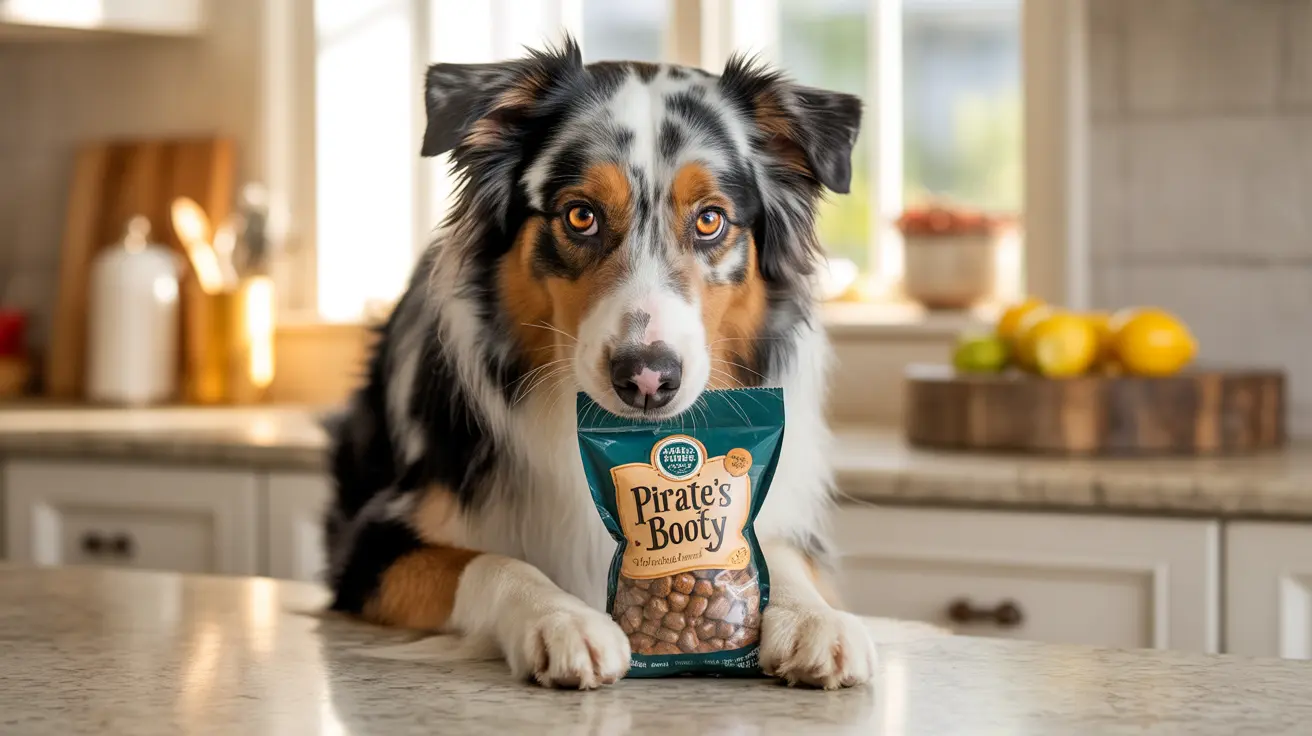As pet owners, we often wonder if sharing our favorite snacks with our furry friends is safe. Pirate's Booty, the popular cheese-flavored puffed snack, is one such treat that raises questions among dog owners. While not explicitly toxic to dogs, there are important considerations before sharing this human snack with your canine companion.
In this comprehensive guide, we'll explore the safety, risks, and alternatives to feeding Pirate's Booty to dogs, backed by veterinary expertise and nutritional science.
Understanding Pirate's Booty Ingredients
Pirate's Booty contains several ingredients that warrant careful consideration for dog consumption:
- Cornmeal and rice flour
- Cheddar cheese and dairy products (whey, buttermilk)
- Canola or sunflower oil
- Salt and seasonings
- Natural flavors and preservatives
While none of these ingredients are immediately toxic, they can pose various health risks to dogs, especially when consumed regularly or in large amounts.
Potential Health Risks for Dogs
Digestive Issues
The dairy content in Pirate's Booty can be particularly problematic for dogs, as most adult canines are lactose intolerant. This can lead to:
- Diarrhea
- Gas and bloating
- Stomach upset
- Vomiting
Nutritional Concerns
The snack's high salt content and fatty ingredients can contribute to several health issues:
- Dehydration
- Excessive thirst
- Potential kidney strain
- Risk of pancreatitis in sensitive dogs
- Weight gain and obesity
When to Be Concerned
If your dog has consumed Pirate's Booty, watch for these warning signs:
- Excessive thirst or urination
- Lethargy or weakness
- Persistent vomiting or diarrhea
- Loss of appetite
- Abdominal pain or discomfort
Contact your veterinarian immediately if you notice any of these symptoms, especially in small dogs or those with existing health conditions.
Healthier Alternatives for Dogs
Instead of Pirate's Booty, consider these safer treat options:
- Plain, air-popped popcorn (no salt or butter)
- Dog-specific training treats
- Small pieces of fresh carrots or green beans
- Commercial dog treats formulated for dental health
- Fresh apple slices (without seeds)
Frequently Asked Questions
Can dogs safely eat Pirate's Booty snacks in small amounts?
While not immediately toxic, it's best to avoid feeding Pirate's Booty to dogs. The combination of dairy, salt, and artificial flavors can cause digestive issues and other health concerns.
What health risks can Pirate's Booty cause in dogs if eaten regularly?
Regular consumption can lead to obesity, digestive problems, sodium imbalance, and potential pancreatitis. Long-term exposure to processed snacks may also contribute to nutritional deficiencies.
Are there specific ingredients in Pirate's Booty that can upset my dog's digestion?
Yes, the dairy products (cheese, whey, buttermilk) can cause lactose intolerance issues, while the salt and oils may lead to gastrointestinal upset and other digestive problems.
What signs should I watch for if my dog eats Pirate's Booty accidentally?
Monitor for excessive thirst, vomiting, diarrhea, lethargy, and signs of digestive discomfort. If these symptoms persist or worsen, consult your veterinarian.
What are healthier snack alternatives to Pirate's Booty for dogs?
Choose dog-specific treats or natural alternatives like plain popcorn, small pieces of fresh vegetables, or commercial dental treats designed specifically for dogs.
Conclusion
While Pirate's Booty isn't toxic to dogs, it's best to keep this human snack away from your furry friend. Instead, focus on providing treats specifically formulated for dogs or natural, healthy alternatives that support their nutritional needs. Always consult with your veterinarian about the best treat options for your specific dog's health and dietary requirements.






